中石油2016通用英语选读课文49The British through My Eyes我眼中的英国人
- 格式:doc
- 大小:48.04 KB
- 文档页数:4
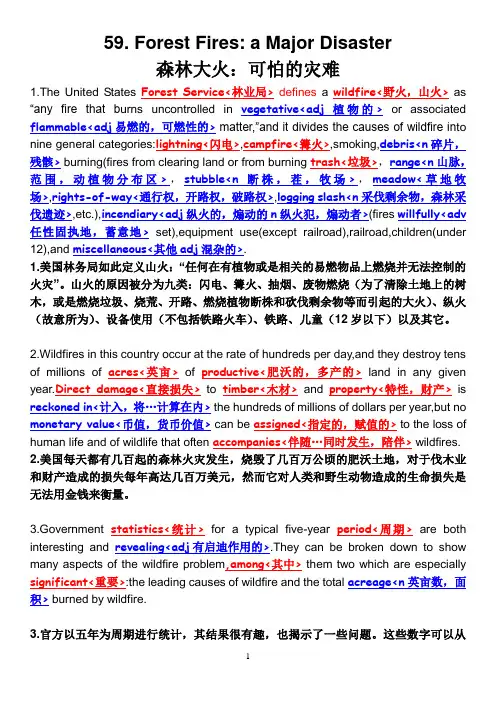
59. Forest Fires: a Major Disaster森林大火:可怕的灾难1.The United States Forest Service<林业局>defines a wildfire<野火,山火>as “any fire that b urns uncontrolled in vegetative<adj植物的>or associated flammable<adj易燃的,可燃性的>matter,”and it divides the causes of wildfire in to nine general categories:lightning<闪电>,campfire<篝火>,smoking,debris<n碎片,残骸> burning(fires from clearing land or from burning trash<垃圾>,range<n山脉,范围,动植物分布区>,stubble<n断株,茬,牧场>,meadow<草地牧场>,rights-of-way<通行权,开路权,破路权>,logging slash<n采伐剩余物,森林采伐遗迹>,etc.),incendiary<adj纵火的,煽动的n纵火犯,煽动者>(fires willfully<adv 任性固执地,蓄意地>set),equipment use(except railroad),railroad,children(under 12),and miscellaneous<其他adj混杂的>.1.美国林务局如此定义山火:“任何在有植物或是相关的易燃物品上燃烧并无法控制的火灾”。
山火的原因被分为九类:闪电、篝火、抽烟、废物燃烧(为了清除土地上的树木,或是燃烧垃圾、烧荒、开路、燃烧植物断株和砍伐剩余物等而引起的大火)、纵火(故意所为)、设备使用(不包括铁路火车)、铁路、儿童(12岁以下)以及其它。
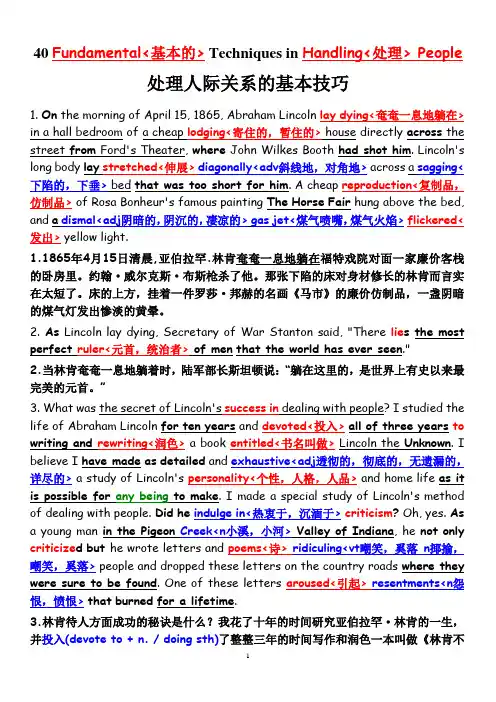
40 Fundamental<基本的> Techniques in Handling<处理> People处理人际关系的基本技巧1. On the morning of April 15, 1865, Abraham Lincoln lay dying<奄奄一息地躺在> in a hall bedroom of a cheap lodging<寄住的,暂住的> house directly across the street from Ford's Theater, where John Wilkes Booth had shot him. Lincoln's long body lay stretched<伸展> diagonally<adv斜线地,对角地> across a sagging<下陷的,下垂> bed that was too short for him. A cheap reproduction<复制品,仿制品> of Rosa Bonheur's famous painting The Horse Fair hung above the bed, and a dismal<adj阴暗的,阴沉的,凄凉的>gas jet<煤气喷嘴,煤气火焰>flickered<发出> yellow light.1.1865年4月15日清晨,亚伯拉罕.林肯奄奄一息地躺在福特戏院对面一家廉价客栈的卧房里。
约翰·威尔克斯·布斯枪杀了他。
那张下陷的床对身材修长的林肯而言实在太短了。
床的上方,挂着一件罗莎·邦赫的名画《马市》的廉价仿制品,一盏阴暗的煤气灯发出惨淡的黄晕。
2. As Lincoln lay dying, Secretary of War Stanton said, "There lie s the most perfect ruler<元首,统治者> of men that the world has ever seen."2.当林肯奄奄一息地躺着时,陆军部长斯坦顿说:“躺在这里的,是世界上有史以来最完美的元首。
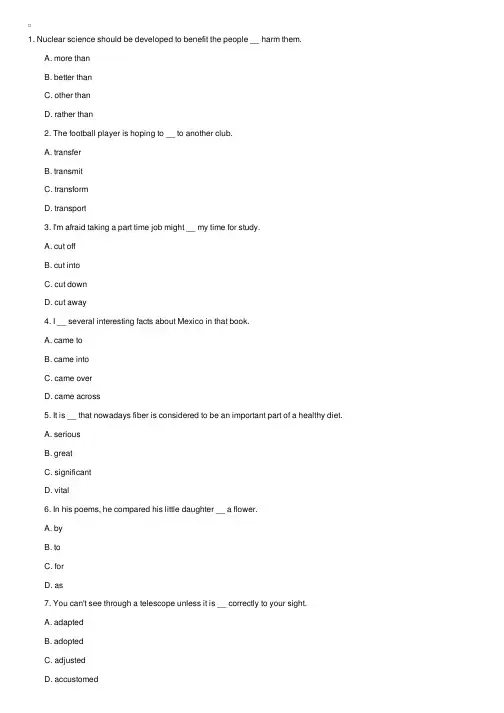
1. Nuclear science should be developed to benefit the people __ harm them. A. more than B. better than C. other than D. rather than 2. The football player is hoping to __ to another club. A. transfer B. transmit C. transform D. transport 3. I'm afraid taking a part time job might __ my time for study. A. cut off B. cut into C. cut down D. cut away 4. I __ several interesting facts about Mexico in that book. A. came to B. came into C. came over D. came across 5. It is __ that nowadays fiber is considered to be an important part of a healthy diet. A. serious B. great C. significant D. vital 6. In his poems, he compared his little daughter __ a flower. A. by B. to C. for D. as 7. You can't see through a telescope unless it is __ correctly to your sight. A. adapted B. adopted C. adjusted D. accustomed 8. Our company decided to __ the contract because a number of the conditions in it had not been met. A. destroy B. refuse C. assume D. cancel 9. You needn't go to a hotel, Lucy, Jack and I will gladly __ for the night. A. make you up B. set you up C. put you up D. call you up 10. He finished the paintings __ for the exhibition. A. for some time B. in good time C. from time to time D. time after time 参考答案及解析 1. 【答案】D 【译⽂】发展核科学应造福于民,⽽不是危害于民。
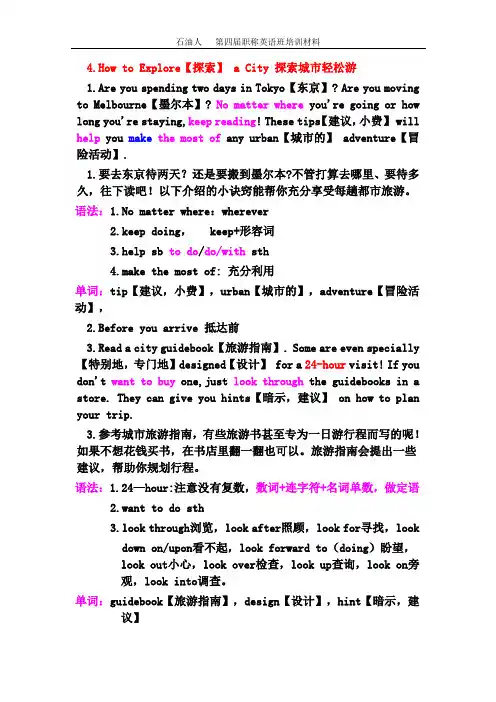
4.How to Explore【探索】 a City 探索城市轻松游1.Are you spending two days in Tokyo【东京】? Are you moving to Melbourne【墨尔本】? No matter where you're going or how long you're staying,keep reading! These tips【建议,小费】 will help you make the most of any urban【城市的】 adventure【冒险活动】.1.要去东京待两天?还是要搬到墨尔本?不管打算去哪里、要待多久,往下读吧!以下介绍的小诀窍能帮你充分享受每趟都市旅游。
语法:1.No matter where:wherever2.keep doing, keep+形容词3.help sb to do/do/with sth4.make the most of: 充分利用单词:tip【建议,小费】,urban【城市的】,adventure【冒险活动】,2.Before you arrive 抵达前3.Read a city guidebook【旅游指南】. Some are even specially 【特别地,专门地】designed【设计】 for a24-hour visit! If you don't want to buy one,just look through the guidebooks in a store. They can give you hints【暗示,建议】 on how to plan your trip.3.参考城市旅游指南,有些旅游书甚至专为一日游行程而写的呢!如果不想花钱买书,在书店里翻一翻也可以。
旅游指南会提出一些建议,帮助你规划行程。
语法:1.24—hour:注意没有复数,数词+连字符+名词单数,做定语2.want to do sth3.look through浏览,look after照顾,look for寻找,look down on/upon看不起,look forward to(doing)盼望,look out小心,look over检查,look up查询,look on旁观,look into调查。
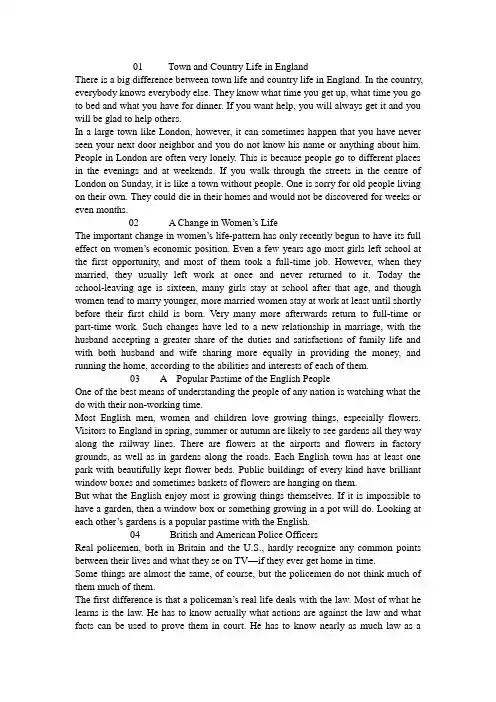
01 Town and Country Life in EnglandThere is a big difference between town life and country life in England. In the country, everybody knows everybody else. They know what time you get up, what time you go to bed and what you have for dinner. If you want help, you will always get it and you will be glad to help others.In a large town like London, however, it can sometimes happen that you have never seen your next door neighbor and you do not know his name or anything about him. People in London are often very lonely. This is because people go to different places in the evenings and at weekends. If you walk through the streets in the centre of London on Sunday, it is like a town without people. One is sorry for old people living on their own. They could die in their homes and would not be discovered for weeks or even months.02 A Change in Women’s LifeThe important change in women’s life-pattern has only recently begun to have its full effect on women’s economic position. Even a few years ago most girls left school at the first opportunity, and most of them took a full-time job. However, when they married, they usually left work at once and never returned to it. Today the school-leaving age is sixteen, many girls stay at school after that age, and though women tend to marry younger, more married women stay at work at least until shortly before their first child is born. V ery many more afterwards return to full-time or part-time work. Such changes have led to a new relationship in marriage, with the husband accepting a greater share of the duties and satisfactions of family life and with both husband and wife sharing more equally in providing the money, and running the home, according to the abilities and interests of each of them.03 A Popular Pastime of the English PeopleOne of the best means of understanding the people of any nation is watching what the do with their non-working time.Most English men, women and children love growing things, especially flowers. Visitors to England in spring, summer or autumn are likely to see gardens all they way along the railway lines. There are flowers at the airports and flowers in factory grounds, as well as in gardens along the roads. Each English town has at least one park with beautifully kept flower beds. Public buildings of every kind have brilliant window boxes and sometimes baskets of flowers are hanging on them.But what the English enjoy most is growing things themselves. If it is impossible to have a garden, then a window box or something growing in a pot will do. Looking at each other’s gardens is a popular pastime with the English.04 British and American Police OfficersReal policemen, both in Britain and the U.S., hardly recognize any common points between their lives and what they se on TV—if they ever get home in time.Some things are almost the same, of course, but the policemen do not think much of them much of them.The first difference is that a policeman’s real life deals with the law. Most of wh at he learns is the law. He has to know actually what actions are against the law and what facts can be used to prove them in court. He has to know nearly as much law as alawyer, and what’s more, he has to put it into practice on his feet, in the dark and, running down a narrow street after someone he wants to talk to.Little of his time is spent in talking with beautiful girls or in bravely facing cruel criminals. He will spend most of his working life arranging millions of words on thousands of forms about hundreds of sad, ordinary people who are guilty--- or not of stupid, unimportant crimes.05 Living SpaceHow much living space does a person need? What happens when his space needs are not met? Scientists are doing experiments on rats to try to determine the effects of overcrowded conditions on man. Recent studies have shown that the behavior of rats is greatly affected by space. If rats have enough living space, they eat well, sleep well and produce their young well. But if their living conditions become too crowded, their behavior and even their health change obviously. They can not sleep and eat well, and signs of fear and worry become clear. The more crowded they are, and more they tend to bite each other and even kill each other. Thus, for rats, populations and violence are directly related. Is this a natural law for human society as well? Is enough space not only satisfactory, but necessary for human survival? These are interesting questions.06 The United NationsIn 1945, representatives of 50 nations met to plan this organization. It was called the United Nations. After the war, many more nations joined.There are two major parts of the United Nations. One is called the General Assembly. In the General Assembly, every member nation is represented and has an equal vote. The second part is called the Security Council. It has representatives of just 15 nations. Five nations are permanent members: the United States, Russia, France, Britain, and China. The 10 other members are elected every two years by the General Assembly. The major job of the Security Council is to keep peace in the world. If necessary, it can send troops from member nations to try to stop little wars before they turn into big ones.It is hard to get the nations of the Security Council to agree on when this is necessary. But they did vote to try to stop wars.07 PlasticWe use plastic wrap to protect our foods. We put our garbage in plastic bags or plastic cans. We sit on plastic chairs, play with plastic toys, drink from plastic cups, and wash our hair with shampoo from plastic bottles!Plastic does not grow in nature. It is made by mixing certain things together. We call it a produced or manufactured material. Plastic was first made in the 1860s from plants, such as wood and cotton. That plastic was soft and burned easily.The first modern plastics were made in the 1930s. Most clear plastic starts out as thick, black oil. That plastic coating inside a pan begins as natural gas.Over the years, hundreds of different plastics have been developed. Some are hard and strong. Some are soft and bendable. Some are clear. Some are many-colored. There is a plastic for almost every need. Scientists continue to experiment with plastics. They hope to find even ways to use them!08 Display of GoodsAre supermarkets designed to persuade us to buy more?Fresh fruit and vegetables are displayed near supermarket entrances. This gives the impression that only healthy food is sold in the shop. Basic foods that everyone buys, like sugar and tea, are not put near each other. They are kept in different aisles so customers are taken past other attractive foods before they find what they want. In this way, shoppers are encouraged to buy products that they do not really need.Sweets are often placed at children’s eye level at the checkout. While parents are waiting to pay, children reach for the sweets and put them in the trolley.More is bought from a fifteen-foot display of one type of product than from a ten-foot one. Customers also buy more when shelves are full than when they are half empty. They do not like to buy from shelves with few products on them because they feel there is something wrong with those products that are there.09 Albert EinsteinAlbert Einstein was born in Germany in 1879, His father owned a factory that made electrical devices. His mother enjoyed music and books. His parents were Jewish but they did not observe many of the religion’s rul es. Albert was a quite child who spent much of his time alone. He was slow to talk and had difficulty learning to read. When Albert was five years old, his father gave him a compass. The child was filled with wonder when he discovered that the compass needle always pointed in the same direction—to be north. He asked his father and his uncle what caused the needle to move. Their answers about magnetism and gravity were difficult for the boy to understand. Y et he spent a lot of time thinking about them. He said later that he felt something hidden had to be behind things.10 Private CarsWith the increase in the general standard of living, some ordinary Chinese families begin to afford a car. Y et opinions of the development of a private car vary from person to person.It gives a much greater degree of comfort and mobility. The owner of a car is no longer forced to reply on public transport, and hence no irritation caused by waiting for buses or taxis. However, others strongly object to developing private cars. They maintain that as more and more cars are produced and run in the street, a large volume of poisonous gas will be given off, polluting the atmosphere and causing actual harm to the health of people.Whether private cars should be developed in Chicago is a difficult question to answer, yet the desire for the comfort and independence a private car can bring will not be eliminated.11 A Henpecked Husband and His WifeThere was once a large, fat woman who had a small, thin husband. He had a job in a big company and was given his weekly wages every Friday evening. As soon as he got home on Fridays, his wife used to make him give her all his money, and then she used to give him back only enough to buy his lunch in his company every day.One day, the small man came home very excited. He hurried into the living-room. His wife was listening to the radio and eating chocolates there.“Y ou will never guess what happened to me to day, dear.” he said.He waited for a few seconds and then added, “I won ten thousand dollars on the lottery!”“That is wonderful! ” said his wife delightedly. But then she pulled a long face and added angrily, “But how could you afford to buy the ticket?”12 A Y oung Man’s PromiseOne day, a young man was writing a letter to his girlfriend who lived just a few miles away in a nearby town. He was telling her how much he loved her and how wonderful he thought she was. The more he wrote the more poetic he became. Finally he said that in order to be with her, he would suffer the greatest difficulties, he would face the greatest dangers that anyone couldn’t imagine. In fact, to spend only one minute with her, he would swim across the widest river, he would enter the deepest forest, and he would fight against the fiercest animals with his bare hands.He finished the letter, signed his name and then suddenly remembered that he had forgotten to mention something quite important. So, in a postscript below his name, he added:“By the way, I’ll be over to see you on Wednesday night, if it doesn’t rain.”13 A Kind NeighborMr. and Mrs. Jones’ apartment was full of luggage, packages, furniture and boxes. Both of them were very busy when they heard the doorbell ring. Mrs. Jones went to open it and she saw a middle-aged lady outside. The lady said she lived next door. Mrs. Jones invited her to come in and apologized because there was no place for her to sit. “Oh, that’s OK.” said the lady. “I just come to welcome to your new home. As you know, in some parts of this city, neighbors are not friendly at all. They are some apartment houses where people don’t know any of their neighbors, not even the ones next door. But in this building, everyone is very friendly with everyone else. We are a big happy family. I am sure you will be very happy here.” Mr. and Mrs. Jones said, “But madam, we are not new dwellers in this apartment. We’ve lived here for two years. We are moving out tomorrow.”14 That Isn’t Our FaultMr. and Mrs. Williams got married when he was twenty-three, and she was twenty. Twenty-five years later, they had a big party, and a photographer came and took some photographs of them.Then the photographer gave Mrs. Williams a card and said, “They’ll be ready next Wednesday. Y ou can get them from studio.”“No,” Mrs. Williams said, “please send them to us.”The photographs arrived a week later, but Mrs. Williams was not happy when she saw them. She got into her car and drove to the photographer’s studio. She went inside and said angrily, “Y ou took some photographs of me and my husband last week, but I’m not going to pay for them.”“Oh, why not?” the photographer asked.“Because my husband looks like a monkey,” Mrs. Williams said.“Well,” the photographer answered, “that isn’t our fault. Why didn’t you think of that before you married him?”15 A Guide's AnswerIn 1861, the Civil War started in the United States between the Northern and the Southern states. The war continued with great bitterness until 1865, when the Northerners were victorious. However, even today, many Southerners have not forgotten their defeat, or forgiven the Northerners.A few years ago, a party of American tourists were going round one of the battlefields of the Civil War with a guide who came from one of the Southern states. At each place, the guide told the tourists stirring stories about how a few Southern soldiers had conquered powerful forces of Northerners there.At last, one of the tourists, a lady who came from the North, stopped the guide and said to him, “ But surely that the Northern army must have won at least one vi ctory in the Civil War?”“Not as long as I’m the guide here, madam,” answered the Southern guide.16 A Qualified PilotThe captain of a small ship had to go along a rocky coast, but he was unfamiliar with it, so he tried to find a qualified pilot to guide him. He went ashore in one of the small ports, and a local fisherman pretended that he was a pilot because he needed some money. The captain took him on board and asked him where to steer the ship.After half an hour, the captain began to suspect that the fisherman did not really know what he was doing and where he was going.“Are you sure you are a qualified pilot?” he asked.“Oh, yes,” answered the fisherman. “I know every rock on this part of the coast.”Suddenly there was a terrible crash from under the ship. At once the fisherman added, “And that’s one of them.”17 Living Things ReactY ou and all organisms live an environment. An environment is made up of everything that surrounds an organism. It can include the air, the water, the soil, and even other organisms.An organism responds to changes in its environment. When an organism responds to a change, it reacts in certain ways. All living things respond in some way.Have you ever noticed how plants and insects respond to light? Plants bend toward light. Insects fly toward light.Living things also respond in other ways. The leaves on some trees respond to a change in season. In autumn, they change colors and then fall off the branches Animals also respond to a change in season. Squirrels save nuts for the winter. Bears sleep through the winter in a cave.Y ou respond to your environment in many ways, too. Y ou may shiver if you are cold. What other ways do you respond to changes in your environment?18 Flowering PlantsWhat are the parts of a flower?Flowers can have male parts and female parts. The female parts make eggs that become seeds. The male parts make pollen. Pollen is a powdery material that is needed by the eggs to make seeds. To make seeds, pollen and eggs must come together. The wind, insects, and birds bring pollen to eggs. Many animals love flowers’ bright colors. They also like a sugary liquid in flowers. This is called nectar.While they drink nectar, pollen rubs off on their bodies. As they move, some of this pollen gets delivered to the female flower parts.Over time, the female parts turn into fruits that contain seeds. Animals often eat the fruits and the seeds pass through their bodies as waste. The animals do no know they are working for the plants by planting seeds as they travel to different places!19 Finding the Direction and LocationHow can you tell which direction? By day, look for the Sun. It is in the east in the morning and the west in the afternoon. At night, use the Big Dipper to help you find the North Star. It would be better to bring a compass because its needle always points north.How do you know how far you have gone? Y ou could count every step. Each step is about two feet. Y ou’d better wear a pedometer which is a tool that counts steps. If you know where you started, which direction you are heading, and how far you have gone, you can use a good map to figure out exactly where you are.Today there is a new way for travelers to figure out where they are. It is the GPS. It has 24 satellites that orbit the earth and constantly broadcast their positions. Someday you may carry a small receiver as you hike and use GPS to find out if you are there yet!20 WavesHow does light get from the sun to the earth? How does music get from the stage to the audience? They move the same way-----in waves!Light and sound are forms of energy. All waves carry energy, but they may carry it differently. Light and sound travel through different kinds of matter. For example, light waves cannot move through walls, but sound waves can. That is why you can hear people talking in another room even though you cannot see them. The energy of some waves is destructive. An earthquake produces seismic waves.Catch a wave. Ask a friend to stand a few feet away from you. Stretch a spring between you. Shake the spring to transfer energy to it. What happens? The spring bounces up and down in waves. When the waves reach your friend, they bounce back to you!Light waves travel 300,000 kilometers (186,000 miles) per second! They can also travel through a vacuum. That is why light from the sun and distant stars can travel through space to the earth!21 SoilsThere are many different kinds of soils. Different soils have different types of rock and minerals in them. Some soils have more water in them than others. Some soils might have more plant and animal material in them, too.Different kinds of soils are found in different parts of the world. There are several kinds of soils found in the United States. In some areas, the soil has a lot of clay. Other soils are very sandy. Loam is a kind of soil that has a good mixture of clay and sand.In some places, soil layers are very thick. Lots of plants grow in places with a thick soil layer. In dry and windy places soil layers are much thinner. Layers of so il on mountains are thin because gravity pulls the soil downhill.The type of soil in a particular place affects what kinds of plants can grow there.22 CrisisLife is a contest! Who will win? A bluebird and sparrow both compete for space to build their nests. A fast-growing maple tree and slower-growing dogwood compete for the sunlight they both need. Oil competes with coal and nuclear power as an energy source for electric power plants!There is a problem. There is a limited amount of space for birds, sunlight for trees, and energy for people! If we do not cut back on our uses of some of our resources, someday they will be gone!How can we use energy today and know we will have enough to go around in the future? We can choose alternate, or replacement, energy resources. It takes the earth millions of years to create coal, oil, and gas. They are nonrenewable resources.Solar energy, wind energy and water energy are renewable resources. It takes the earth millions of years to create coal, oil, and gas. They are nonrenewable resources.Solar energy, wind energy and water energy are renewable. What other ways can we conserve our sources? How can we make sure there is always enough to go around?23 America’s Worst SurpriseDecember 7, 1941 was one of the worst days in American history. Nearly all Americans who are old enough to remember that day can still remember what they were doing at the moment they heard “the news”. The news was that America had been attacked!Shortly before 2:00 P.M., a radio dispatch came into Washington from Honolulu, Hawaii. “Air Raid, Pearl Harbor—This is no drill.” Japanese planes had begun an attack on the largest American military base in the Pacific. They first destroyed planes on the ground. Then they bombed the ships in the harbor.No one had expected the attack. So no one was prepared for it. And it did not take long for Japanese to do their damage. When the smoke cleared, the Navy counted its losses. Eighteen ships had been sunk or badly damaged. Nearly 150 planes had been destroyed. More than 2,400 Americans had been killed and more than 1,200 wounded.24 Great Depression in the U.S.In 1929, the bills started to come in. American industry had produced too many goods. Americans could not afford to buy all of them. So factories had to cut down on their production. Many workers lost their jobs. Investors tried to get their money back. But businesses did not have enough money to pay them. Banks tried to get their money back from investors. But the investors could not pay, either. Too many people owed money. And few of them could pay their bills.During the next few years, business got worse and worse. By 1932, banks all over the country were closing.People without money could not buy goods. So more businesses closed. More and more people lost their jobs. By 1932, more than 12 million Americans were jobless. Millions more were earning barely enough to live on. The country was in a great depression they had never experienced before.25 A Place of Our OwnWe are all usually very careful when we buy something for the house. Why? Becausewe have to live with it for a long time. We paint a room to make it brighter, so we choose the colors carefully.We buy new curtains in order to match the newly decorated room, so they must be the right color. We move the furniture round so as to make more space—or we buy new furniture—and so on. It is an endless business.Rich or poor, we take time to furnish a room. Perhaps some people buy furniture in order to impress their friends. But most of us just want to enjoy our surroundings. We want to live as comfortably as we can afford to. We spend a large part of our lives at home. We want to make a small corner in the world which we can recognize as our own.26 Travel for WorkY ou can see them in every airport in the world. They are businessmen and women who have to travel for their work.When they first applied for the job, they may have thought of good food and hotels, huge expense accounts and fashionable cities. Now they have to sit in airport lounges, tired and uncomfortable in their smart clothes, listening to the loudspeaker announce “The fight of Tokyo, or Berlin, or New Y ork is delayed for another two hours.” Some people say to me, “How lucky you are to be able to travel abroad in you r work! Y ou can go sightseeing without paying any money by yourself!” They think that my job is like a continual holiday. It is not.There are advantages, of course, and I do thin I am lucky, but only because I can go to places I would never visit if I was a tourist.27 IntelligenceAre some people born clever, and others born stupid? Or is intelligence developed by our environment and our experience?Strangely enough, the answer to these questions is yes. To some extent our intelligence is given us at birth, and no amount of special education can make a genius out of a child born with low intelligence. On the other hand, a child who lives in a boring environment will develop his intelligence less than one who lives in rich and varied surroundings. Thus, the limits of a person’s intelligence are fixed at birth, whether or not he reaches those limits will depend on his environment. This view, held by most experts now, can be supported in a number of ways. As is easy to show that intelligence is to some extent something we are born with. The closer the blood relationship between two people is, the closer they are likely to be in intelligence.28 A Free Dress Every WeekThe temptation to steal is greater than ever before especially in large shops and people are not so honest as they once were.A detective recently watched a well-dressed woman who always went into a large store on Monday mornings. One Monday, there were fewer people in the shop than usual when the woman came in, so it was easier for the detective to watch her. The woman first bought a few small articles. After a little time, she chose one of the most expensive dresses in the shop and handed it to an assistant who wrapped it up for her as quickly as possible. The woman simply took the parcel and walked out of the shop without paying. When she was arrested, the detective found out that the shop assistantwas her daughter. Believe it or not, the girl “gave” her mother a free dress every week!29 TimeTime is tangible. One can gain time, spend time, waste time, save time, or even kill time. Common questions in American English reveal this concrete quality as though time were a possession. “Do you have any time?”, “Can you get some time for this?”, “How much free time do you have?” The treatment of time as a possession influences the way that time is carefully divided.Generally, Americans are taught to do one thing at a time and may be uncomfortable when an activity is interrupted. In businesses, the careful scheduling of time and the separation of activities are common practices. Appointment calendars are printed with 15-,30-, and 60-minute time slots. The idea that “there is a time and place for everything” extends to American social life. Visitors who drop by without prior notice may interrupt their host’s personal time. Thus, calling friends on the telephone before visiting them is generally preferred to visitors’ dropping by.30 CartoonistsIn a good cartoon, the artist can tell in a few lines as much as a writer can tell in half a dozen paragraphs. The cartoonist not only tells a story but he also tries to persuade the reader to his way of thinking. He has great influence on public opinion. In a political campaign, he plays an important part. Controversial issues in Congress or at meetings of the United Nations may keep the cartoonist well-supplied with current materials.A clever cartoonist may cause laughter because he often uses humor in his drawings. If he is sketching a famous person, he takes a prominent feature and exaggerates it. Cartoonists, for instance, like to lengthen an already long nose and to widen an already broad grin. This exaggeration of a person’s characteristics is called caricature. The artist uses such exaggeration to put his message across.31 Water PollutionWater is very important to us. Factories and plants need water for industrial uses and large pieces of farmland need it for irrigation. Without water to drink, people die in a short time.Today most water sources are so dirty that people must purify water before drinking. Water becomes dirty in many ways: industrial pollution is one of them. With the development of industry, plants and factories pour tons of industrial wasters into rivers every day. The rivers have become seriously polluted, and the water is becoming unfit for drinking or irrigation. The same thing has also happened to our seas and oceans. So, the problem of water pollution is almost worldwide.Scientists of many countries have done a lot of work to stop pollution. The polluted water in some places has become clean and drinkable again. Perhaps one day the people in all towns and cities will be drinking clean water. That day, we believe, is not very far off.32 Making a ComplaintComplaining about faulty goods or bad services is never easy. But if something you have brought is faulty or does not do what was claimed for it, you are not asking for a favor to get it put right.Complaints should be made to a responsible person. Go back to the shop where you bought the goods, taking with you any receipt you may have. In a small store the assistant may also be the owner so you can complain direct. In a chain store, ask the manager. If you telephone, ask the name of the person who handles your enquiry, otherwise you may never find out who dealt with the complaint later. If you do not want to do it in person, write a letter. Stick to the facts and keep a copy of what you write. At this stage you should give any receipt numbers, but you should not need to give receipts or other papers to prove you bought the article.33 Where Do the British LiveNearly everyone in Britain would like to own their own home and, whether they do or not, they are prepared to put time and money into decorating and furnishing it or even making structural alterations to it. Because of the climate and because of the expense involved in going out for the evening, the British spend a lot of time at home and a large part of their social life takes place there.Y oung people tend to stay with their families longer these days as accommodation is expensive but, when they move away to a job or college, there are various options open to them. They can get lodgings with a landlady. This means that they rent a room in someone’s house and have breakfast with the family. They can also get a bed-sitting room, that is to say one self-contained room in which they can cook, live and sleep. Alternatively, they can share a rented flat or house with a group of young people, perhaps the most popular option of all.34 Will Computers Replace Human Beings?We are in the computer age today. The computers are working all kinds of wonders now. They are very useful in automatic control and data processing. At the same time, computers are finding their way into the home. They seem to be so clever and ca n solve such complicated problems that some people think sooner or later they will replace us.But I do not think that there is such a possibility. My reason is very simple: computers are machines, not humans. And our tasks are far too various and complicated for any one single kind of machine to perform.Probably the greatest difference between man and computer is that the former can do things of his own while the latter can do nothing without being programmed. In my opinion, computers will remain nothing but an extension of our human brains, no matter how clever and complicated they may become.36 ArtistsEvery artist knows in his heart that he is saying something to the public. Not only does he want to say it well, but he wants it to be something which has not been said before.What visual artists, like painters, want to say is easy to make out but difficult to explain, because painters translate their experiences into shapes and colors, not words. They seem to feel that a certain selection of shapes and colors, out of the countless billions of possible, is exceptionally interesting for them and worth showing to us. Most artists take their shapes and colors from the world of nature and from human bodies in motion and response; their choices indicate that these aspects of the world。

42 Becoming Wealthy: It's Up to You致富取决于你自己1. Critics<评论家> often speak of“the rich”with none-too-subtle<微妙的> disdain<n/vt蔑视>, as if those at the very top of the income ladder are all dishonest<狡诈的>people or as if becoming rich is difficult and means others must become poorer. While we would be the first to admit that some rich people are dishonest, we must add that achieving the status<n身份,地位,情形,状况> of “the rich”(defined, say, by having a net worth<净收入,净值> of $1,000,000) is not particularly difficult, contrary to<和…相反> popular<普通的> wisdom<常识,知识>. The rules for acquiring substantial<adj大量的,坚固的,物质的,实质的>wealth are few, simple. This fact suggests that becoming rich for most Americans is a matter of choice.1、评论家们一说起富人往往带有明显的蔑视。
就好像收入高的层次的人们都是狡诈之人,或者意味着成为富有阶层不容易而且必须以其他人变得更穷为代价。
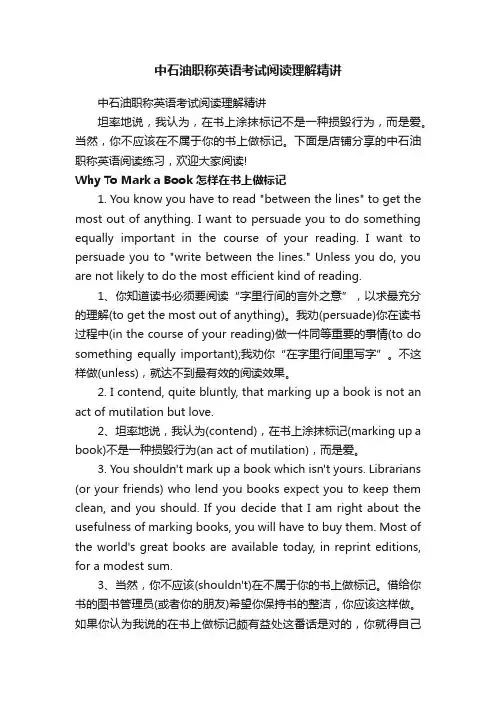
中石油职称英语考试阅读理解精讲中石油职称英语考试阅读理解精讲坦率地说,我认为,在书上涂抹标记不是一种损毁行为,而是爱。
当然,你不应该在不属于你的书上做标记。
下面是店铺分享的中石油职称英语阅读练习,欢迎大家阅读!Why To Mark a Book 怎样在书上做标记1. You know you have to read "between the lines" to get the most out of anything. I want to persuade you to do something equally important in the course of your reading. I want to persuade you to "write between the lines." Unless you do, you are not likely to do the most efficient kind of reading.1、你知道读书必须要阅读“字里行间的言外之意”,以求最充分的理解(to get the most out of anything)。
我劝(persuade)你在读书过程中(in the course of your reading)做一件同等重要的事情(to do something equally important);我劝你“在字里行间里写字”。
不这样做(unless),就达不到最有效的阅读效果。
2. I contend, quite bluntly, that marking up a book is not an act of mutilation but love.2、坦率地说,我认为(contend),在书上涂抹标记(marking up a book)不是一种损毁行为(an act of mutilation),而是爱。
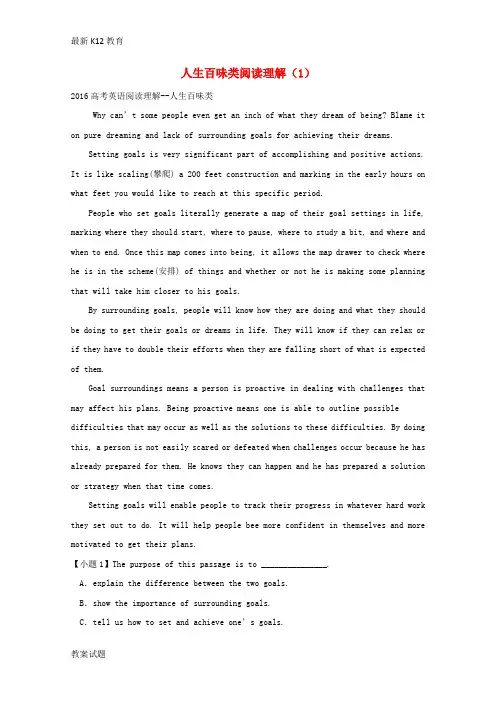
人生百味类阅读理解(1)2016高考英语阅读理解--人生百味类Why can’t some people even get an inch of what they dream of being? Blame it on pure dreaming and lack of surrounding goals for achieving their dreams.Setting goals is very significant part of accomplishing and positive actions. It is like scaling(攀爬) a 200 feet construction and marking in the early hours on what feet you would like to reach at this specific period.People who set goals literally generate a map of their goal settings in life, marking where they should start, where to pause, where to study a bit, and where and when to end. Once this map comes into being, it allows the map drawer to check where he is in the scheme(安排) of things and whether or not he is making some planning that will take him closer to his goals.By surrounding goals, people will know how they are doing and what they should be doing to get their goals or dreams in life. They will know if they can relax or if they have to double their efforts when they are falling short of what is expected of them.Goal surroundings means a person is proactive in dealing with challenges that may affect his plans. Being proactive means one is able to outline possible difficulties that may occur as well as the solutions to these difficulties. By doing this, a person is not easily scared or defeated when challenges occur because he has already prepared for them. He knows they can happen and he has prepared a solution or strategy when that time comes.Setting goals will enable people to track their progress in whatever hard work they set out to do. It will help people bee more confident in themselves and more motivated to get their plans.【小题1】The purpose of this passage is to _______________.A.explain the difference between the two goals.B.show the importance of surrounding goals.C.tell us how to set and achieve one’s goals.D.tell us setting goals makes one confident.【小题2】The underlined word “proactive” in paragraph 5 may have the closest meaning to “________”.A.positive B.carefulC.brave D.prepared【小题3】According to the author, one had better ___________ in making a goal in life.A.take an active attitudeB.create a scheme as a wholeC.consider the possible troublesD.check where he is frequently【小题4】From the passage, we can reach the conclusion that___________________.A.achievements come to those who are well preparedB.everyone faces the situation which is scaring or threateningC.the higher one sets his goal, the more achievements he will haveD.success never es to people who always blame2016高考英语阅读理解--人生百味类To Friend or Not To FriendWe all love our parents and turn to them when we’re in need, but would you like them to hear the conversations you have with your friends on the school playground or lunch queue? Social networking sites have become extensions of the school hallways, so wou ld you add your parents as “friends” and allow them to view your online activities and conversations with friends?In the past the generation gap included a technology gap, where children were up to date with latest technology and parents were left behind, content to continue their day to day lives as they always had because they had no need to know more about technology. However, more and more parents are beginning to realize just how important social networks are in their lives. This realization has given many parents the motivation to education themselves about social networking sites.These days many people are attracted to social networking sites because they can choose who they have around them; there’s also a certain amount of control over p rivacy that we don’t get in real life. Sometimes we feel that privacy is violated when we must accept a “friend” request from a parent or family member.It’s a difficult choice whether or not to allow a parent to become a part of our online lives. On the one hand we don’t want to “reject” their request because that might hurt their feelings or make them feel you have something to hide. On the other hand if you do accept, then you could have a sense of being watched and no longer feel free to comment or communicate the way you did before.A recent survey suggested that parents shouldn’t take it personally if their child ignores their request, “When a teen ignores a parent’s friend request, it doesn’t necessarily mean that they are hiding something, but it could mean that this is one part of their life where they want to be independent.”Perhaps talking with parents and giving explanations would help soften the blow if you do choose not to add them to your friends list.【小题1】From Paragraph 2, we learn that _______.A.parents feel secure about their privacy onlineB.social networks successfully fill the generation gapC.parents have realized the importance of social networksD.social networks offer a platform for parents to communicate【小题2】Teenag ers may refuse a parent’s friend request because _______.A.they hide something from their parentsB.they are unwilling to be watched by parentsC.their parents tend to fall behind in technologyD.their parents make negative comments on them【小题3】The passage is mainly about _______.A.privacy onlineB.social networksC.the generation gapD.parents’ friend requests【小题4】The passage is written mainly for _______.A.parents B.teenagersC.teachers D.researchers阅读下列短文, 从给的四个选项 (A、B、C和D) 中, 选出最佳选项。
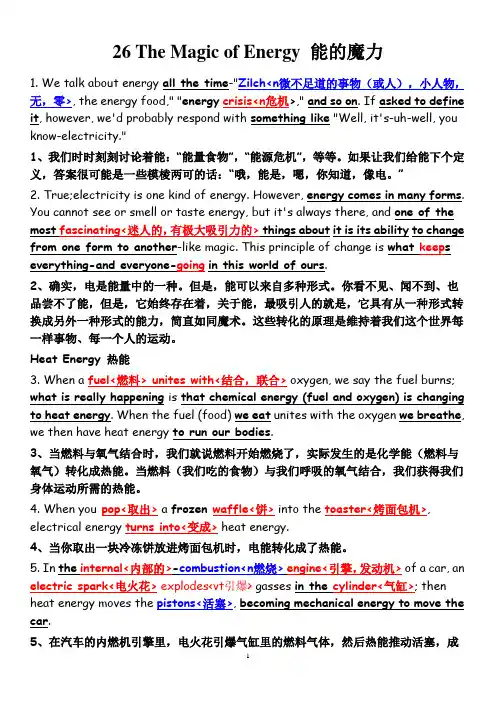
26 The Magic of Energy 能的魔力1. We talk about energy all the time-"Zilch<n微不足道的事物(或人),小人物,无,零>, the energy food," "energy crisis<n危机>," and so on. If asked to define it, however, we'd probably respond with something like "Well, it's-uh-well, you know-electricity."1、我们时时刻刻讨论着能:“能量食物”,“能源危机”,等等。
如果让我们给能下个定义,答案很可能是一些模棱两可的话:“哦,能是,嗯,你知道,像电。
”2. True;electricity is one kind of energy. However, energy comes in many forms. You cannot see or smell or taste energy, but it's always there, and one of the most fascinating<迷人的,有极大吸引力的>things about it is its ability to change from one form to another-like magic. This principle of change is what keep s everything-and everyone-going in this world of ours.2、确实,电是能量中的一种。
但是,能可以来自多种形式。
你看不见、闻不到、也品尝不了能,但是,它始终存在着,关于能,最吸引人的就是,它具有从一种形式转换成另外一种形式的能力,简直如同魔术。
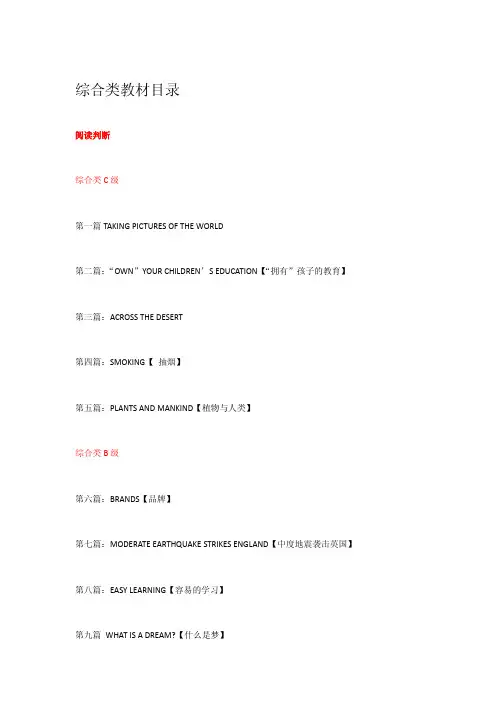
综合类教材目录阅读判断综合类C级第一篇TAKING PICTURES OF THE WORLD第二篇:“OWN”YOUR CHILDREN’S EDUCATION【“拥有”孩子的教育】第三篇:ACROSS THE DESERT第四篇:SMOKING【抽烟】第五篇:PLANTS AND MANKIND【植物与人类】综合类B级第六篇:BRANDS【品牌】第七篇:MODERATE EARTHQUAKE STRIKES ENGLAND【中度地震袭击英国】第八篇:EASY LEARNING【容易的学习】第九篇WHAT IS A DREAM?【什么是梦】第十篇:THE WORKERS' ROLE IN MANAGEMENT【工人在企业管理中的角色】综合类A级第十一篇:STAGE FRIGHT【舞台恐惧】第十二篇STARTING A NEW TRADITION第十三篇:A DOG’S DILEMMA 【狗的两难境地】第十四篇:THE NATIONAL TRUST【国家托管委员会】第十五篇:LOWER BODY FAT MEANS BETTER PERFORMANCE【低脂肪意味着更好的表现】概括大意与完成句子综合类C级THE MAKING OF A SUCCESS STORY【发迹史】THE PAPER CHASE【文件整理】ENGLISH AND ENGLISH COMMUNITY 【英语和英语群体】ALASKA【阿拉斯加】US SIGNS GLOBAL TOBACCO TREATY【美国签订了全球烟草协议】综合类B级HOW WE FORM FIRST IMPRESSION 【对别人的第一印象是怎样形成的】HOW TO ARGUE WITH YOUR BOSS【怎样与老板争论】SCREEN TEST【透视检查】TRANSPORT AND TRADE【交通和贸易】WASHOE LEARNED AMERICAN SIGN LANGUAGE【WASHOE学会了美国手语】综合类A级IS THERE A WAY TO KEEP THE BRITAIN’S ECONOMY GROWING?【有促进英国经济增长的办法吗?】INTELLIGENCE: A CHANGED VIEW 【智力:一个转变了的观念】WARD OFF TRAVEL BUGS【防止旅行中的疾病困扰】HEARTBEAT OF AMERICA【美国的心搏】SMOKE GETS IN YOUR MIND【吸烟会影响人的精神】阅读理解综合类C级TELLING TALES ABOUT PEOPLE【讲述关于人们的故事】OUTSIDE-THE-CLASSROOM LEARNING MAKES A BIG DIFFERENCE【课外学习带来很大不同】SHARK ATTACK ! 【小心鲨鱼!】FEAST ON TURKEY AND GOOD WISHES AT THANKSGIVING【火鸡盛宴和感恩节的祝福】THE TRAVELS OF IBN BATTUTA【伊本白图泰游记】Native American Pottery【美国本土陶器】MODERN SUN WORSHIPPERS【现代日光浴者】THE CHANGING MIDDLE CLASS【变化中的中产阶级】SINGLE-PARENT KIDS DO BEST【单亲幼儿最出色】A LETTER FROM ALAN【艾伦的来信】THE DEVELOPMENT OF BALLET【芭蕾舞的发展】SMUGGLING【走私】THE BARBIE DOLLS【芭比娃娃】SLEEP【睡眠】ORBITAL SPACE PLANE【轨道航天飞机】THE SAHARA【撒哈拉沙漠】综合类_B级EIFFEL IS AN EYEFUL【引人注目的埃菲尔铁塔】GOAL OF AMERICAN EDUCATION【美国教育的目标】THE FAMILY【家庭】TALES OF THE TERRIBLE PAST【讲述可怕的过去】SPACING IN ANIMALS【动物间的间隔距离】SOME THINGS WE KNOW ABOUT LANGUAGE【我们所知道的关于语言的一些事情】THE ONLY WAY IS UP【只好向上】The Romance of Arthur【亚瑟的传奇】INCOME【收入】SEEING THE WORLD CENTURIES AGO【看许久以前的世界】IMPORTANCE OF SERVICES【服务业的重要性】THE NATIONAL PARK SERVICE【国家公园的服务机构】I'II BE BACH【我也能成为巴赫】“LUCKY”LORD LUCAN —ALIVE OR DEAD【“幸运的”鲁肯伯爵——是死是活】POOL WATCH【泳池监护】THE CHEROKEE NATION【柴罗基部落】OSEOLA MCCARTY 【老妇人】综合类_A级TO HAVE AND HAVE NOT【逃亡】GOING HER OWN WAY【选择她自己的路】LIFE AS A MOVIE EXTRA【群众演员的人生】【2014年新增】POP MUSIC IN AFRICA【非洲的流行音乐】WHY SO MANY CHILDREN【为什么有这么多的孩子】EAT TO LIVE【为生存而食】NEW US PLAN FOR DISEASE PREVENTION【美国疾病防治新政策】THE OPERATION OF INTERNATIONAL AIRLINES【国际航空公司的经营】SAUNA【桑拿浴】CAN BUILDINGS BE DESIGNED TO RESIST TERRORIST ATTACK【建筑设计能使建筑抵御恐怖袭击吗?】AMERICANS GET TOUCHY【越来越爱肢体接触的美国人】WOMEN STAYING IN MINI-SKIRTS FOR LONGER【女性在迷你裙上逗留的时间更长】DEFENDING THE THEORY OF EVOLUTION STILL SEEMS NEEDED 【捍卫进化论仍必要】NARROW ESCAPE【九死一生】FINDING ENLIGHTENMENT IN SCOTLAND【苏格兰启蒙运动】THE BEGINNING OF AMERICAN LITERATURE【美洲文学的开端】OLDER VOLCANIC ERUPTIONS【远古火山喷发】补全短文综合类C级WHAT WE TAKE FROM AND GIVE TO THE SEATEAMWORK IN TOURISMThe Value of TearsTHE FIRST FOUR MINUTESFINANCIAL RISKS综合类B级MOBILE PHONESTHE WORLD'S LONGEST BRIDGEPUBLIC RELATIONSStyle, Not FashionANTS AS A BAROMETER OF ECOLOGICAL CHANGE 141 综合类A级VIRTUAL DRIVERMEN SMELL OF CHEESE AND WOMEN OF ONIONSTHE VALUE OF MOTHERHOODTHE SANDWICH GENERATIONEINSTEI N NAMED “PERSON OF T HE CENTURY"完形填空综合类C级第一篇 A LIFE WITH BIRDS【有鸟陪伴的生活】第二篇 A LUCKY BREAK【幸福的骨折】第三篇GLOBAL WARMING 【全球变暖】第四篇 A SUCCESS STORY【一个成功的故事】第五篇TRAFFIC IN OUR CITIES 【城市的交通】综合类B级第六篇TEACHING AND LEARNING【教与学】第七篇THE DIFFERENCE BETWEEN MAN AND COMPUTER 【人与电脑的区别】第八篇LOOK ON THE BRIGHT SIDE 【看光明的一面】第九篇THE FIRST BICYCLE【第一辆自行车】第十篇WORKING MOTHERS 【职业母亲】综合类A级第十一篇SCHOOL LUNCH【学校午餐】164第十二篇 A POWERFUL INFLUENCE【强大的影响】166第十三篇THE OLD GATE【古老之门】第十四篇FAMILY HISTORY【家族史】第十五篇HELEN AND MARTIN【海伦和马丁】阅读判断综合C阅读判断第一篇Taking Pictures of the World1.Belt has never traveled to________.Belt从来没有去过________.Antarctica is the only continent Belt hasn`t seen yet.南极洲是唯一的一个Belt从来没有去过的大洲。
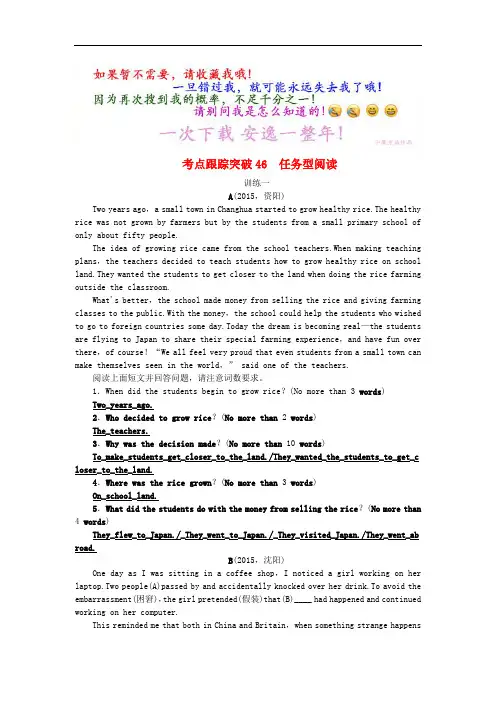
考点跟踪突破46 任务型阅读 训练一 A(2015,资阳) Two years ago,a small town in Changhua started to grow healthy rice.The healthy rice was not grown by farmers but by the students from a small primary school of only about fifty people. The idea of growing rice came from the school teachers.When making teaching plans,the teachers decided to teach students how to grow healthy rice on school land.They wanted the students to get closer to the land when doing the rice farming outside the classroom. What's better,the school made money from selling the rice and giving farming classes to the public.With the money,the school could help the students who wished to go to foreign countries some day.Today the dream is becoming real—the students are flying to Japan to share their special farming experience,and have fun over there,of course!“We all feel very proud that even students from a small town can make themselves seen in the world,” said one of the teachers. 阅读上面短文并回答问题,请注意词数要求。 1.When did the students begin to grow rice?(No more than 3 words) Two_years_ago. 2.Who decided to grow rice?(No more than 2 words) The_teachers. 3.Why was the decision made?(No more than 10 words) To_make_students_get_closer_to_the_land./They_wanted_the_students_to_get_closer_to_the_land. 4.Where was the rice grown?(No more than 3 words) On_school_land. 5.What did the students do with the money from selling the rice?(No more than 4 words) They_flew_to_Japan./_They_went_to_Japan./_They_visited_Japan./They_went_abroad. B(2015,沈阳) One day as I was sitting in a coffee shop,I noticed a girl working on her laptop.Two people(A)passed by and accidentally knocked over her drink.To avoid the embarrassment(困窘),the girl pretended(假装)that(B)____ had happened and continued working on her computer. This reminded me that both in China and Britain,when something strange happens around you or when you are in an embarrassing situation,(C)people_tend(倾向于)to_use_this_common_way_to_not_catch_other_people's_attention. A lot of the time,Britons use selfdepreciating humor(自嘲式的幽默).This is a wellknown British characteristic.For example,imagine walking(D)____ your friends and you fall over.Your friend may just say(E)“旅途愉快!” Or you may just laugh about how clumsy(笨拙的)you are.For many Britons,making fun of yourself is a way of showing your strength of character. Also,British are considerate when it comes to embarrassing others.For example,students(F)usually have a birthday party every year.So during the school day,a student will give out invitations to the class.If one person doesn't get an invitation,but the rest of the class does,he or she will feel embarrassed.To avoid it,it's common for students to even invite people who aren't(G)their friends. 1.写出文中画线部分(A)和(F)的同义词或近义词: walked often 2.在文中(B)和(D)的空白处填入适当的单词: nothing with 3.将文中画线部分(C)改写为:people tend to use this common way so that other people won't notice it. 4.将文中画线部分(E)译成英语:Have_a_nice_trip! 5.文中画线部分(G)指代的是:students' C(2016,郴州) Once upon a time,in the forest there lived a baby elephant,who had no friends.None of the animals wanted to be his friend because he was too large. One day,a wild fire happened in the forest.The animals ran to safer places.The dry trees caught fire and the fire was sure to go all around the forest.The baby elephant ran to the nearest river,collected much water in his trunk(象鼻) and rushed to the burning trees.He sprayed(喷) the water on the fire.Finally,he put out the fire. Later,while he was resting after the hard job,all the animals and birds came to him and expressed their thanks for his kind help in time.They were now ready to regard him as their good friend and their hero.They said,“A friend in need is a friend indeed.” The baby elephant was happy to get so many friends and played games with them.He walked through the forest,carrying several small animals and birds on his back. 根据短文内容,回答下列问题。 1.Why did the baby elephant have no friends at first? Because_he_was_too_large. 2.Where did the wild fire happen? In_the_forest. 3.Who put out the fire in the end? The_baby_elephant. 4.At last,did all the other animals regard the baby elephant as a good friend? Yes,they_did. 5.What can we learn from the story?
-----WORD格式--可编辑--专业资料-----2016年英语中考短文填空专题训练步骤(Step)一、跳过空格,通读短文,了解大意根据首字母填空的题型,实际上相当于完形填空,必须先快速通读全文,尽量理解文章的主要内容,再仔细揣摩需要填词的句子,只有完全理解全句的意思,才能准确填写单词。
二、复读短文,确定语义,判断词形。
1.利用上下文的语境,结合所学过的知识,先确定空格处所需词语的意义.2.再根据空格在句子中的位置,判断其在句中充当的成分,从而确定所填词的词性,再依据词语搭配和语法规则,判断所填的词的正确形式。
例如,单,复数、形容词,副词的级别、时态、语态、语气及非谓语动词的形式等,要特别注意时态的呼应及主谓一致。
三、通读短文,检查答案注意点(Attentions)一、确定正确的时态1.根据句中的时间状语来确定时态。
例如,现在完成时的时间状语:already, yet, ever, never, just, before, for, since+时间点;since+过去时态的句子, so far, by now, in/during the last/past few years etc2.注意时态呼应。
在主从复合句中,主句谓语与从句谓语动词的时态是相互照应的。
1)在宾语从句中,如果主句是一般现在时,从句根据需要选用任何时态;如果主句是一般过去时,从句要用过去的某种时态;如果从句表达的是一个客观事实不管主句是何种时态,从句仍用一般现在时。
2)在状语从句中,如果主句是一般将来时,或是祈使句,或是含情态动词的句子,时间和条件状语从句中要用一般现在时表示将来发生的动作。
3.根据上下文确定时态。
有时句子没有明显的时间状语,也不能用时态呼应规则来对照,这时就可以根据上下文内容来判断时间关系,确定时态。
如:如:“You’ve certainly touched my heart with your choices. And I’m sure the Five Friendlies_____(touch) the heart of the world.”句意是“你以你的选择已经震撼了我的心,我相信这五个福娃将会给世人带来震撼。
49 The British through My Eyes我眼中的英国人1.While I was studying in London as a visiting scholar<学者>,I came to know more of the British culture and customs.During one year’s study,I noticed that the British behaved quite differently in many ways compared to<与…相比> the Chinese.1.作为一名访问学者,在伦敦学习的一年时间里,我对英国的文化与习俗开始有了更多的了解,注意到英国人在许多方面与我们中国人的表现大不相同。
2.British people tend to be<趋向于> rather conservative<adj保守的,守旧的n保守派>.The conservative attitude is only to accept things familiar to<熟悉的> them and to be suspicious of<怀疑>anything that is strange or foreign.They like antiques<n古董,古物adj古时的,过时的> so much that they never hesitate<犹豫> to spend money buying them even if they are useless.A lot of British people remain strongly attached to<使依恋,把…放在>coal or wood fireplaces<壁炉>,even though<尽管> it causes a great deal of <大量>work and adds to the pollution of the air.Some of them liked to spend a great deal of money and trouble putting in a dummy<adj虚拟的,假的n哑巴,傀儡,假人>fireplace,which would never be used;they thought a living room without a fireplace would be a room without a basic characteristic of cosiness<基本特性cosiness n舒适,安逸>.Many rooms are in fact heated by gas or electric fires,but they are usually placed in front of old-style fireplaces,and many people choose electric fires designed so as to look like coal fires,with imitation<n人造的,模仿,效法,冒充,赝品,仿造物> pieces of coal which are lit<发光light的过去式及过去分词> when the current<电流> is turned on.2.英国人一般相当保守。
他们保守的态度表现在他们只接受他们熟悉的东西,而对任何外来的或陌生的东西持怀疑态度。
他们非常喜欢古董,以至对那些即使没什么用处的东西,也会毫不犹豫地买回来。
现在,尽管使用煤或木头的壁炉很麻烦,而且会增加空气污染,但是仍有许多英国人家非常喜欢使用。
他们有些人会不惜花钱和费事,给房间安装上一个从不使用的假壁炉。
他们认为,居室里如果没有壁炉就失去了让人感觉舒适惬意的基本特点。
许多房间实际上是用煤气或电炉取暖的,但取暖器通常放在老式壁炉前面。
许多英国人喜欢选择外观设计像烧煤的壁炉式的电暖气,当电源接通时,里面的假煤块就会发出红光。
3.To other Europeans,the best-known quality<特点>of the British,and in particular<尤其是> of the English,is “reserve<n缄默、矜持,储备,储藏量,保守,拘谨>.”A reserved person is one who does not talk very much to strangers,does not show much emotion<情绪>,and seldom gets excited.It is difficult to get to know a reserved person;he never tells you about anything of himself,and you may work withhim for years without ever knowing where he lives,how many children he has,and what his interests are. English people tend to be like that.When starting a conversation<交谈>,one can never ask questions like “How old are you?Wha t is your salary?Where did you buy your watch” etc.Similarly<同样的>,conversation in Britain is generally quiet and restrained<adj克制的,受限制的,拘谨的,有限的>.Loud speech is considered ill-bred<缺乏教养,没有教养>.The reluctance<勉强,不愿意> to communicate with<沟通> each other is an unfortunate<遗憾的,不幸的> quality in some way <在某种意义上讲>since it tends to give the impression<印象> of coldness<冷淡,冷漠>,and it is true that the English are not noted for <因…而著名>their generosity<n慷慨,宽大>and hospitality<好客>.On the other hand,they are perfectly human behind their barrier<障碍> of reserve and may be quite pleased when a friendly stranger or foreigner succeeds for a time in breaking the barrier down.Closely related to English reserve is English modesty<谦逊>.Within their heart,the English are perhaps no less conceited<adj自负的,自大的,逞能的> than anybody else,but in their relations with others,they value<注重,重视>,at least,a show of modesty.Self-praise<自夸> is felt to be ill-bred.If a person who is very good at table tennis is asked if he is a good player,he will seldom r eply “Yes”,because people will think him conceited<自负的>.He will probably give an answer like,“I am not bad.”or “I am very keen on<热衷于,有兴趣的>it.”Also the English are famous for sense of humour<幽默感>.Its starting point is self-depreciation<自我贬低>;they like laughing at their own faults,failures and embarrassments<窘境,尴尬>,even at their ideals<幻想,理想的事物>.But they never laugh at a disabled person or a madman.Sympathy<同情> is felt to be stronger than laughter.3.与其他欧洲人相比,英国人,尤其是英格兰人,最显著的特点就是“矜持”。
一个矜持的人不大愿意与陌生人交谈,不大受情绪影响,也很少激动。
要了解生性矜持的人很困难,因为他从来不告诉别人有关他自己的事。
你可能与他共事多年却不知道他住在哪儿,有几个孩子,也不知道他对什么感兴趣。
英国人往往就是这个样子。
互相攀谈时,绝不会有人问起“你多大了?”,“你挣多少钱?”或“你的手表在哪里买的?”这样的问题。
同样,英国人谈话时声音很轻,并能克制住自己,大声讲话被看作为缺乏教养。
从某些方面来讲,这种不愿与他人交往的特点是令人遗憾的,因为这会给人一种冷漠的印象。
的确,英国人并非以豪爽与好客著称。
但是,尽管他们矜持,却还是非常富有人情味的;一旦一个友好的陌生人或外国人能打破这种障碍,英国人也会十分高兴。
与英国人的矜持密切相关的是他们的谦逊。